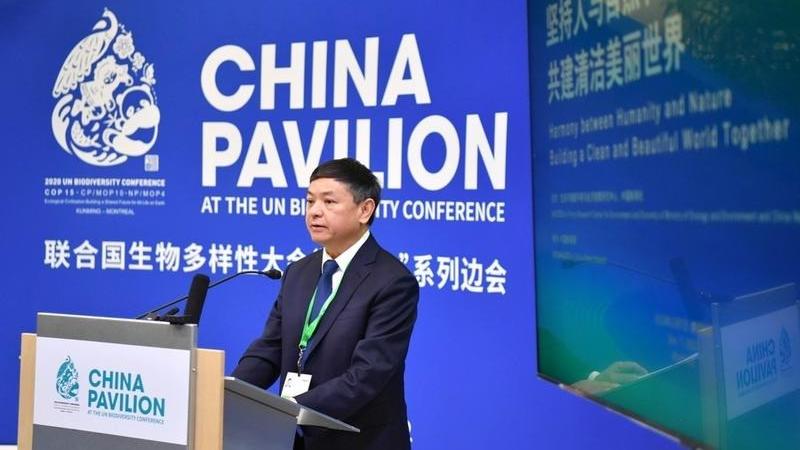 Huang Runqiu, president of the 15th meeting of the Conference of the Parties to the UN Convention on Biological Diversity, delivers a speech at the first side event of the China Pavilion of the second phase of COP15 in Montreal, Canada, Dec 7, 2022. (LIAN YI / XINHUA)
Huang Runqiu, president of the 15th meeting of the Conference of the Parties to the UN Convention on Biological Diversity, delivers a speech at the first side event of the China Pavilion of the second phase of COP15 in Montreal, Canada, Dec 7, 2022. (LIAN YI / XINHUA)
MONTREAL — China's implementation of biodiversity conservation goals in the past decade was better than the global average, Huang Runqiu, president of the 15th meeting of the Conference of the Parties (COP15) to the UN Convention on Biological Diversity said here Sunday.
As one of the richest countries in biodiversity and one of the first countries to join the convention, China has effectively protected 90 percent of terrestrial ecosystem types and 74 percent of key state-protected wildlife populations. More than 300 rare and endangered wildlife populations have been well restored, Huang, also China's minister of ecology and environment, said in his address to a side event on youth involvement.
A total of 960 million mu (64 million hectares) of afforestation has been completed, accounting for a quarter of the world's total
READ MORE: COP15 president lauds progress, looks ahead
A total of 960 million mu (64 million hectares) of afforestation has been completed, accounting for a quarter of the world's total. Huang said China's forestation area has long ranked first in the world, giving credit to the young people in China.
"The youth from China can play a critical role in biodiversity conservation. During China's presidency, we know China has achieved a lot as far as biodiversity conservation is concerned. We also know the youths are part of those achievements," Elizabeth Maruma Mrema, executive secretary of the UN Convention on Biological Diversity, said during the event.
READ MORE: China, Canada to cooperate to ensure success of COP15 phase 2
A global youth initiative was also released, calling on young people to be leaders and advocates for biodiversity conservation.


